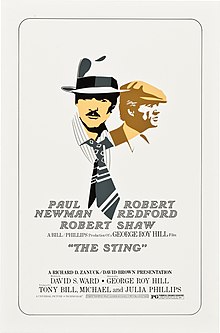
Back The Sting AN اللدغة (فيلم) Arabic نشتر (فیلم، ۱۹۷۳) AZB Ужилването Bulgarian Žaoka (film) BS El cop Catalan Podraz Czech Афера (фильм, 1973) CV The Sting Welsh Sidste stik Danish
| The Sting | |
|---|---|
 Theatrical release poster (alternate design) | |
| Directed by | George Roy Hill |
| Written by | David S. Ward |
| Produced by | |
| Starring | |
| Cinematography | Robert Surtees |
| Edited by | William Reynolds |
| Music by | Marvin Hamlisch |
Production companies | |
| Distributed by | Universal Pictures |
Release date |
|
Running time | 129 minutes |
| Country | United States |
| Language | English |
| Budget | $5.5 million[1] |
| Box office | $257 million |
The Sting is a 1973 American heist film directed by George Roy Hill and starring Paul Newman, Robert Redford and Robert Shaw.[2] Set in September 1936, involving a complicated plot by two professional grifters (Newman and Redford) to con a mob boss (Shaw).[3] Hill had previously directed Newman and Redford in the Western Butch Cassidy and the Sundance Kid (1969). The screenplay, written by David S. Ward, inspired by real-life cons perpetrated by brothers Fred and Charley Gondorff and documented by David Maurer in his 1940 book The Big Con: The Story of the Confidence Man.
The film plays out in distinct sections with old-fashioned title cards drawn by artist Jaroslav "Jerry" Gebr in a style reminiscent of the Saturday Evening Post. It is noted for its use of ragtime, particularly the melody "The Entertainer" by Scott Joplin, which was adapted (along with other Joplin pieces) for the film by Marvin Hamlisch (and a top-ten chart single for Hamlisch when released as a single from the film's soundtrack). The film's success created a resurgence of interest in Joplin's work.[4]
Released on Christmas of 1973, The Sting was a massive critical and commercial success and hugely successful at the 46th Academy Awards, nominated for ten Oscars and winning seven, including Best Picture, Best Director, Best Film Editing and Best Original Screenplay; Redford was also nominated for Best Actor. The film rekindled Newman's career after a series of big-screen flops. Regarded as having one of the best screenplays ever written, The Sting was selected in 2005 for preservation in the U.S. National Film Registry of the Library of Congress as being "culturally, historically, or aesthetically significant". A sequel film, also written by David S. Ward, was released in 1983.
- ^ "The Sting". The Numbers. Archived from the original on November 1, 2013. Retrieved June 4, 2020.
- ^ "The Sting". Turner Classic Movies Database. Archived from the original on October 2, 2017. Retrieved February 23, 2016.
- ^ Variety film review; December 12, 1973, page 16.
- ^ Berlin, Edward A. (1996). "Scott Joplin". Classical Net. Archived from the original on May 9, 2008. Retrieved September 8, 2012.